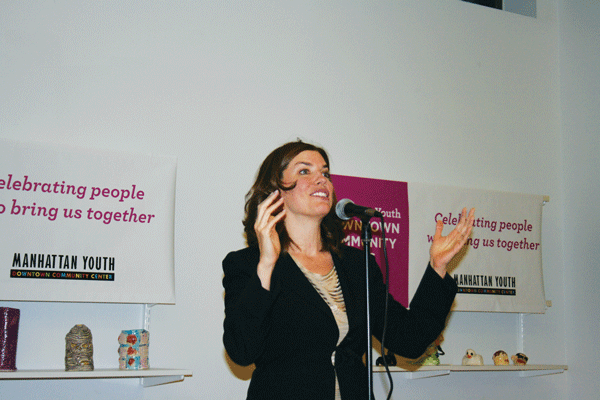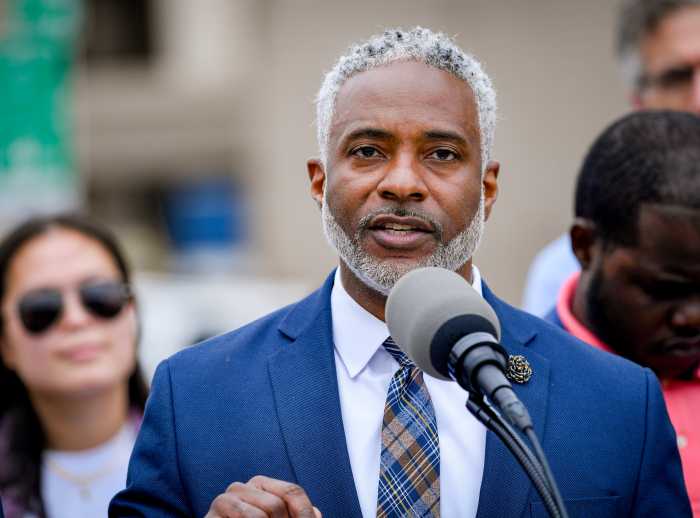
BY ALINE REYNOLDS |It’s been an eventful seven years, to say the least, for Downtown civic leader Julie Menin, whose third and final term as Community Board 1 chairperson is ending in June. Last week, Menin sat down with the Downtown Express to reflect on the high and low points of her tenure.
Menin’s departure from the board this year coincides with her aspiration to become Manhattan’s next borough president. The Tribeca resident is eagerly awaiting Borough President Scott Stringer’s announcement in the coming year about his run for mayor in order to officially declare her candidacy.
And, while she didn’t witness the sunsetting of the Lower Manhattan Development Corporation or the resolution of the World Trade Center — as she might have hoped — Menin, 44, looks back on her tenure very favorably and is regarded by many as a steadfast leader who played a pivotal role in Downtown’s post-9/11 rebirth.
Helping to convince Mayor Mike Bloomberg to keep the trials of alleged 9/11 mastermind Khalid Sheikh Mohammed and other potential culprits outside of New York City was at the top of Menin’s list of accomplishments as C.B. 1 chair. The U.S. government’s proposition involved setting up an estimated 2,000 security checkpoints around the Foley Square Federal Courthouse and elsewhere Downtown.
Having owned and operated Vine, a small business across from the New York Stock Exchange, Menin spoke to the detrimental effects of the ubiquitous checkpoints and inspections of the Downtown community that would have accompanied terrorism trials in the area.
“Even if [the government] had overestimated and it was 1,000 [checkpoints]…the results would have been devastating,” she said.
In early 2010, Menin brought forth the idea of holding a federal court trial on Governors Island — a proposal Bloomberg slammed as “one of the dumber ideas” he had ever heard.
Rather than fire back at the mayor, Menin recounted, she took out a map of the Southern District of New York in search of alternative federal court, not military, trial venues and came up with Stewart Air National Guard Base, the Federal Bureau of Prisons and West Point, all located miles away from what is arguably the country’s biggest terrorist target.
The feds finally decided on holding the trials in Guantanamo Bay, Cuba.
Bill Love, who served on C.B. 1 for seven years, recalled the high level of anxiety Downtown residents felt in anticipating that the trials might take place in their own backyard.
“There were a lot of people who were almost in a panic about that, particularly in parts of Chinatown, where they saw the neighborhood shut down for five years,” said Love.
The dispute over the 9/11 terror trials wasn’t the only mayoral clash C.B. 1 had under Menin’s leadership. In November 2010, the board passed a resolution opposing the appointment of Cathie Black as Schools Chancellor of the city Department of Education.
Four months later, Black stepped down from her position, and Bloomberg openly admitted he had made a mistake in appointing her.
As a board member of the L.M.D.C., Menin eventually took a firm stand against the city-state agency by voting twice against the renewal of its annual operations budget. She was the only board member to do so.
“I believed the organization should sunset… I thought they should disperse all the money they had immediately and close down,” she explained.
But Menin wasn’t able to see that goal realized. Due to her firm stance against the agency’s extension, the board ultimately kicked her off the advisory panel of the L.M.D.C.’s community-cultural enhancement program, Menin said.
Nevertheless, Love believes her unpopular votes were crucial and were worth the potential loss in community input.
“I think in organizations like that, which have a tendency to perpetuate themselves, you need somebody who’s a lone wolf,” he said.
In 2010, Menin fought for the reallocation of $200 million in L.M.D.C. funds, half of which was allotted to the World Trade Center Performing Arts Center (P.A.C.). Had she kept her mouth shut, the money would have likely been deposited in the bank account of Con Edison, the utility company that claimed significant economic loss from 9/11, she said.
“Con Edison came to the community board meeting and said publicly that, if I didn’t back down, they were going to raise every New Yorker’s rates by $50,” she recalled.
Menin proceeded to write to the NYS Public Service Commission demanding that it look into the matter. Ultimately, the money was redirected, and Con Ed received none of the $200 million in L.M.D.C. funds. Years earlier, in 2002, Con Ed had received $168 million from an entirely separate pot of money authorized by the federal government.
These and other funds the board secured were crucial to the revitalization of Downtown, according to C.B. 1 Financial Committee Chair Ro Sheffe.
“Corporate entities like Con Ed are set up in such a way financially they can cope with losses like that, in ways that mom-and-pop merchants cannot,” he explained.
The siting of the P.A.C., however, didn’t pan out the way Menin hoped. She fought for its move to the base of 130 Liberty St. (known as Tower 5), where she says it could have been built faster and at a lower cost, but the city decided to stick with its original plans to erect it at site 1B, home to the temporary PATH station, at the intersection of Greenwich and Vesey Streets.
Then came two of the most contentious issues in recent New York City history: the Islamic community center and mosque — ultimately dubbed Park51 — and Occupy Wall Street, whose birthplace lies in the heart of C.B. 1’s catchment area.
In spring 2010, the board, addressing the hoards of Park51 protestors, drafted a carefully-worded resolution that advocated the construction of a community center.
“I think there are two fundamental American tenets at stake: freedom of religion and right to property ownership,” said Menin.
The board omitted mention of the mosque in the resolution so as to avoid a potential breach of separation of church and state clause of the U.S. Constitution. The project now seems to be on hold as Park51 developer Sharif El-Gamal battles out his lease on the lot with property owner Con Edison in court.
Menin’s gesture of diplomacy hardly satisfied the scores of opponents, mostly out-of-towners, who swarmed the May 25, 2010 full-board meeting and later sent death threats and gruesome illustrations to her home address and the board’s Chambers Street offices.
“It was brutal,” Menin recalled.
While not accompanied by threats, the issue last fall that became known as the Great Sukkah Controversy — in which a local rabbi requested a city permit to construct the Jewish ritual structure in Duane Park — evoked another fundamental tenet, namely the right to worship in a public space.
After making calls to every Tribeca developer she knew, Menin finally got through to one that ended up offering space next to the Church Street School for Music and Art, on Warren Street, as long as she arranged for the provision of sanitary and security facilities.
“My belief is that, if you approve one religious use of public parks, you must approve [them all],” she said. “I don’t believe that our public parks should be overrun with Christmas trees…and all different kinds of religious objects.”
Menin also walked the tightrope of Occupy Wall Street, another highly divisive topic that spawned numerous iterations of board resolutions. With the help of the board’s financial district committee, the board reached near-consensus on the topic.
But finding a middle ground isn’t always the solution, according to board member Allan Tannenbaum, who said that on controversial subjects such as Occupy Wall Street, the board should have eschewed what he deems political correctness and what Menin might refer to as compromises.
“While it was a normal inclination for Julie to seek a common ground and find a compromise, I don’t think that seeking a compromise in this situation was the right thing to do — it was very black and white,” said Tannenbaum. “I think she should have prevented [Occupy Wall Street] from coming to the board.”
“In my opinion, [Park51 and Occupy] shouldn’t have been considered,” echoed Marc Ameruso, the board’s assistant secretary. “The next leader needs to stay out of these political, social issues.”
During Menin’s tenure as chair, the board also helped sway the Department of Education to build three new neighborhood schools and the Department of City Planning to rezone Northern Tribeca with an inclusionary zoning provision that incentivizes real estate developers to build affordable housing units. As a result, big-box retailers are prevented from opening up shop in Tribeca, Menin said.
As Menin sets her sights on all of Manhattan for her campaign trail, which will involve expanding her Rolodex to include constituency groups across the borough, Lower Manhattan, the North Moore Street resident indicated, will always hold a special place in her heart.
She remembers the daunting task of poring over the approximately 5,200 design submissions during her two-year stint on the National Sept. 11 Memorial jury. She had given birth to the eldest of her three sons just two weeks prior to the jury’s commencement.
“The juxtaposition between spending days reviewing the nationwide outpouring of loss and grief, and then coming home to my son and thinking about the day when I would first walk through the memorial with him,” she said, “was incredibly powerful.”




































